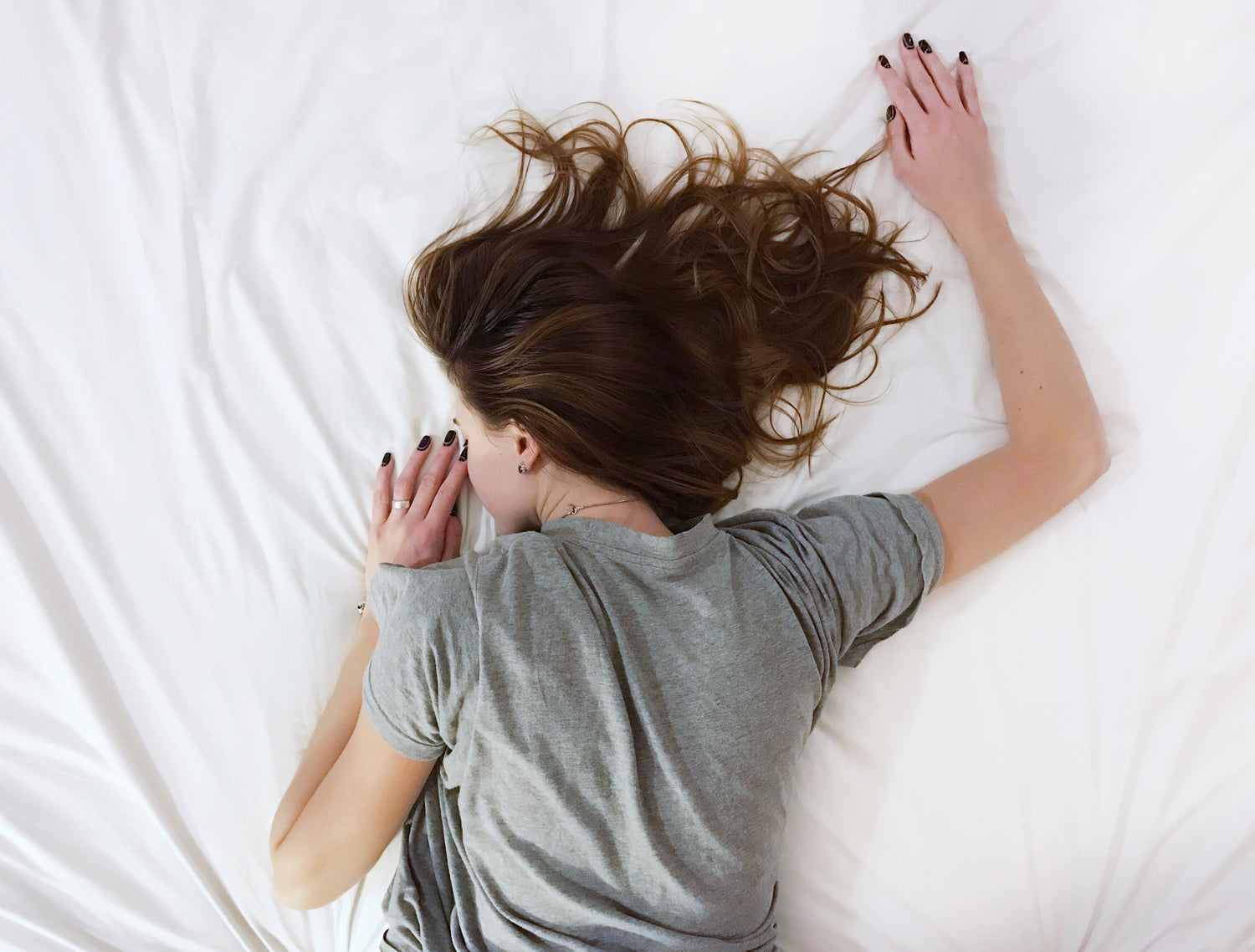Caffeine And Sleep: How Long Coffee Stays In Your Body
For most Americans, there is nothing better than starting your day with a nice cup of coffee to rouse you from your sleep.
Since it was discovered, caffeine has advanced through the ranks of popularity. It’s so diverse that it has escaped the limitations of a coffee mug and nowadays we can find it in sodas, energy drinks, and even supplements.
It’s so widespread that most of us never stop to think about the possible implications of caffeine consumed on a daily basis, but there are some good reasons why we should.
Caffeine affects our sleeping routines, which may also have an impact on our general health. Science has taken quite a bit of interest in this subject and has conducted numerous studies to see how it works.
These studies cover subjects like what's the recommended amount of caffeine for human consumption or if drinking before bed time has the most undesirable consequences, but they also go as far as investigating how drinking caffeine in the morning affects human sleep.
A good night’s sleep is fundamental to our well-being, so it is convenient to understand how caffeine impacts our sleeping patterns and how we can safely enjoy a cup of coffee while reducing the effects it might have.
This blog’s purpose is to help out in understanding these two matters.
Caffeine and your body
In this section we will explain how caffeine works and the impact it has on your body and overall health.
Caffeine at work
To fully understand how caffeine works, we must first introduce you to a very important neurotransmitter called adenosine.
Adenosine is a very important neurotransmitter for the central nervous system since it plays a key role in regulating our sleep-wake cycles and how the body reacts to exhaustion.
When you wake up, adenosine decreases in your system, chasing the tiredness away. Then it slowly builds up throughout the day, making you feel tired in the evening.
The way caffeine works is by blocking adenosine reception, and by that process your body feels more awake. That’s why so many people choose coffee as a breakfast drink, because it feels easier to wake up.
However, coffee only blocks these receptors temporarily, and that can have an impact on your energy levels as it wears off.
The impact of caffeine on overall health
Let’s take a look at some of the possible consequences of caffeine in your system. We’ll take a look at how it impacts your brain and overall health.
Caffeine and your brain
The major impact that caffeine consumption has on mental health is related to its sleep disrupting effects.
Too much caffeine can have a lasting impact on your sleep-wake cycles, which can lead to sleep deprivation and sleep disorders. It can also lead to acute and chronic insomnia, which can significantly impact your quality of life.
Disruption to your sleeping patterns is not the only possible consequence of too much caffeine. There are studies that link caffeine overconsumption to greater levels of anxiety, which can have an effect on your emotional well-being.
Caffeine and your body
One of the major impacts that caffeine consumption has on our bodies is the ability to activate our fight or flight mode. This response is what usually happens when our body feels threatened.
Our system starts releasing adrenaline and noradrenaline, preparing our body to either fight or escape. To do so, we experience an increased breathing rate, blood pressure, and heart rate.
This is an adaptive response, which has benefits for our survival, but when we experience this state freely and often, it can be detrimental to our health.
Some symptoms of caffeine overconsumption may include diarrhea, nausea, muscle tremors, excessive sweating, and an increase in blood sugar levels.
All these effects can be particularly dangerous for people at risk of gastric disorders or hypertension. If you suffer from these conditions it would be better to significantly limit your intake of caffeine.
How much time does caffeine stay in your system?
There is no precise answer to this question, but science can shed some light on this particular inquiry. The time that caffeine resides on your body can be greatly affected by your genetic makeup.
According to a study done by Harvard, there are six genetic variations that show differences in the way coffee is metabolized in your system.
Regardless of these variations, there is a general path that happens after caffeine consumption. Studies show that you can feel the maximum effects of caffeine from 30 to 60 minutes after ingesting it.
After fifteen minutes, your body will have absorbed up to 95 percent of your caffeine intake and it will clear out from your body after four to six hours.
Caffeine and the quality of your sleep
Now that we’ve explained how coffee works and how it affects your body, it is time to get into one of the major aspects of human daily life that is influenced by coffee consumption.
We’ll explain how caffeine affects sleep efficiency, and then we will provide some signs that you can check to see if you are affected by this particular problem.
The impact of caffeine on your sleep quality
How does caffeine affect sleep? There are multiple ways. Caffeine can greatly influence the quality of your sleep and the way you go through the sleep cycle. According to some studies, high caffeine consumption can delay the onset of slow-wave sleep and REM, making it harder to actually rest while sleeping.
Its effects can lead to insomnia, restlessness, and feelings of exhaustion even after having a full night of sleep.
Does caffeine keep you awake?
As we explained before, caffeine affects the interaction between adenosine and your system. Adenosine is the neurotransmitter that communicates to your body how sleepy you are feeling.
Caffeine blocks adenosine receptors, and by doing this, it can keep you awake and alert for longer periods of time.
How do I know if caffeine is influencing my sleep?
There are a couple of signs and symptoms that come with poor sleep quality. If you experience some of these while also recognizing high caffeine intake, you should reconsider your caffeine consumption.
Let’s take a look at some of the most common signs that show you might be sleep deprived.
Drowsiness
As you can imagine, one of the most common symptoms of sleep deprivation is drowsiness and daytime sleepiness. If you feel tired and drowsy during the day, you might have interferences in the amount of time or quality of your sleep.
Stress
Poor sleep can lead to increased feelings of stress, irritability, and mood instability. This is particularly interesting because stress can also make it harder to fall asleep, so it is a reinforcer of poor sleep that, in turn, causes more stress.
Difficulties in focus and concentration
Poor sleep impacts the ability to stay alert and focused, so being able to concentrate can become quite difficult when our sleep is impaired.
Work memory
Insufficient sleep can also impact work memory, which is also known as short-term memory. Work memory is one of the most important executive functions. It is in charge of keeping track of the information we use while we work on different projects.
Sleep deprivation reduces our ability to retain and control information as we work, so it affects productivity.
It is important to underline that the quality of our sleep is not only influenced by caffeine consumption. That said, irresponsible caffeine consumption can significantly contribute to poor sleep quality, so it is essential to remain vigilant about how caffeine intake affects your sleep.
What can I do to reduce the effects of coffee on my sleep quality?
We realize that for a lot of people, coffee and caffeine are non-negotiable. So for all of you that can’t see relinquishing this beverage as an option, we have some good news. You don’t have to go into caffeine abstinence!
If you moderate the consumption of caffeine and follow these simple tips, you’ll probably succeed in achieving nights of good sleep.
Let’s take a look at the following things you can do to reduce the effects of caffeine on the quality of your sleep.
Reduce your caffeine intake
The first one is quite reasonable. If you know that over-consumption of caffeine impacts the quality of your nocturnal sleep, reducing your intake will surely decrease its influence.
How much caffeine should you consume? Health experts recommend keeping your intake at no more than 250ml per day for either coffee or other caffeinated drinks. So be mindful of the caffeine content.
Caffeinate earlier
As we’ve previously explained, caffeine usually stays in your body only for four to six hours. A good approach to consuming caffeine while keeping healthy sleeping habits would be to avoid caffeine intake up to six hours before sleep.
Drinking coffee earlier allows for more recuperation time, so you could limit your consumption to the morning.
Hydrate
Did you know that drinking caffeine while dehydrated heightens the effects of the drug? If you stay hydrated, the effects of caffeine consumption can be lowered, and the body will be better at eliminating it from your system.
Go for decaf
Fair warning, there is no such thing as fully decaffeinated coffee. However, decaf drastically reduces the amount of caffeine present in your coffee.
It reduces the amount to a similar proportion you can find in tea leaves. If you don’t see yourself forgoing a cup after dinner or in the afternoon, changing to decaf might be the best adjustment!
Also, taking a nap might help alleviate the symptoms of a poor night’s sleep. Nothing beats an hour of daytime recovery sleep.
Make sure your sleeping environment is comfortable
Having a comfortable sleeping environment is an essential strategy for having a good night’s sleep and can help you relax at night even if you’ve consumed too much coffee. Making your bed with high-quality bedding can help create an oasis for calming the mind and helping you feel ready for sleep.
One way you can help yourself achieve higher sleep quality is by investing in quality bedding supplies. Take a look at our Hotel Collection Duvet Cover Set for a duvet that will optimize your bed. It’s made with double-brushed microfiber, so you know it will be as comfortable as stylish.
If you want to avoid drowsiness, a good bed sheet set can go a long way. Take a look at our 100% Organic Cotton 400 Thread Count Bed Sheet Set. This set is as comfortable as it gets and is made with organic, long-staple combed cotton for unparalleled softness.
Consider buying a good duvet cover to help make your bed more inviting. Our Shaggy Duvet Cover Set has an extra soft feel that will keep you snuggly and comfy in bed and will help you achieve the best possible rest.
One thing that can help you get ready to sleep is a quality sheet set. Give our 100% Flax Linen Bed Sheet Set a chance. This sheet set is famously breathable and will keep you fresh throughout the night.
Check out our Throw Pillow Insert Sets for a couple of pillows you can use to turn any couch into a napping paradise. They come in different sizes to suit your every need and are a great way to add extra levels of support!
Do you know what else would be a good idea for your health? A good pair of pillows that support your neck while you sleep. Take a look at our Premium Bed Pillows for a pair of pillows that are fluffy and will support you in whatever position you sleep at night.
To conclude
Caffeine is a very present substance in our life, and depending on how you consume it, it can be a pleasurable and functional habit in your life.
Nevertheless, it comes with some disadvantages that might have an impact on your life, sleeping patterns, and general health.
We hope this blog has succeeded in showing you how caffeine affects our bodies and what precautions you can take to keep it in your life without disrupting your sleep duration.
Don’t forget to check out the following products. They will surely help you achieve the best setting for a good night’s sleep:
-
For the best bed pillows available in the market, go for our Premium Bed Pillows. They are fluffy while firm and will provide the best possible support for your head while you sleep.
-
Take a look at our Throw Pillow Insert Sets for a set of different sized throw pillows you can add to your couch, chair, or bed. They are a very practical way to add support for your body for sleeping or napping.
-
Consider our 100% Organic Cotton 400 Thread Count Bed Sheet Set for a set that is comfortable and luxurious.
-
For a sheet set that will keep you cool during the night, give our 100% Flax Linen Bed Sheet Set a chance. You won’t regret it.
-
Look out for our extra soft duvet cover set that will keep you in bed for longer periods of time, go for our Shaggy Duvet Cover Set.
-
Go for our Hotel Collection Duvet Cover Set if you want a microfiber duvet cover that will enhance the style of your bedroom while keeping you comfy in bed.




